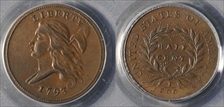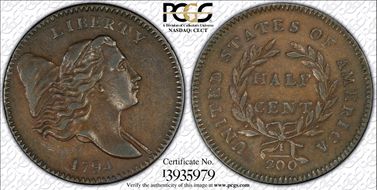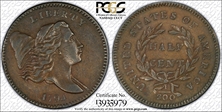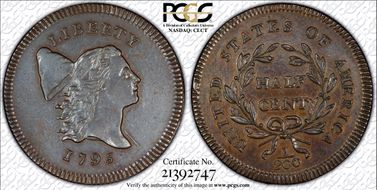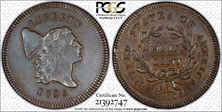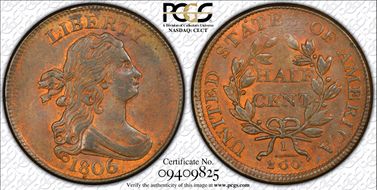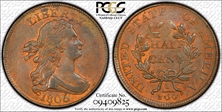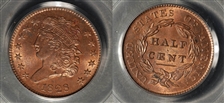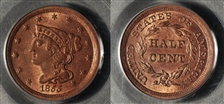Golbrecht's Raisinet Collection 的钱币相册
C-4, B-4, Low R.3. EAC 50, PQ! Manley Die State 2.0, with the die defect atop the 7. This wonderful example of this first year issue has nearly ideal color over smooth, blemish-free surfaces with well-defined, full flowing hair. It's an impressively sharp and smooth representative of this popular single-year type. Chocolate-brown dominates both sides, with a glimpse of deeper brown toning present on the lower left obverse and central reverse. Liberty's cheek and forehead display a hint of friction, but the designs are exquisitely impressed aside from minor softness on some of the letters in AMERICA. Marks are minor for the grade, and the only identifiers are two faint, superficial marks behind the cap, and two blemishes of similar small size below and between AM of AMERICA. These are inconspicuous because of subsequent natural toning, and the quality and beauty of the piece remains irrefutable. Thomas Jefferson made the half cent the lowest denomination in the 1784 “Notes on Coinage” that he submitted to the federal government. Eventually, after much delay and Congressional inaction, Jefferson's proposal emerged as the Mint Act of April 2, 1792. David Rittenhouse, Adam Eckfeldt, and Robert Birch combined to execute the design of the small copper coin with Birch and Joseph Wright engraving the dies. By May 1793 over 30,000 copper half cent planchets had been prepared and on July 20 the Philadelphia Mint coined its first 7,000 specimens. Mint employees produced a further 24,934 pieces on July 26 and the final 3,400 examples on September 18. Having delivered a total of 35,344 1793 half cents, the Mint closed on the latter date so that its staff could flee Philadelphia and its annual yellow fever epidemic.
C-2a, B-2b, High R.2. EAC 40. PQ. The Small Letters Edge subvariety. Evenly struck and undeniably attractive, this sharp golden-brown example boasts plentiful luster within the hair curls and wreath. A tiny obverse rim nick at 9 o'clock will be missed by most observers, and a minor gray spot precedes the U in UNITED.
C-2a, B-2b, High R.2. EAC 40. PQ. The Small Letters Edge subvariety. Evenly struck and undeniably attractive, this sharp golden-brown example boasts plentiful luster within the hair curls and wreath. A tiny obverse rim nick at 9 o'clock will be missed by most observers, and a minor gray spot precedes the U in UNITED.
1795 1/2 C Lettered Edge AU55 C-1, B-1, R.2. Toned a medium to dark brown in color and quite even. The strike is sharp throughout, quite an event as so many of the 1795 half cents come with poorly struck devices. Excellent surfaces are the rule, and this piece is a delight to study. There is a very faint scratch down Liberty's face below her eye, and for identification purposes a tiny planchet flake resides above the post of the E in STATES. A very scarce coin in this relatively lofty grade, with a high quality planchet and good overall eye appeal. From The Melrose Bay Collection
1795 1/2 C Lettered Edge AU55 C-1, B-1, R.2. Toned a medium to dark brown in color and quite even. The strike is sharp throughout, quite an event as so many of the 1795 half cents come with poorly struck devices. Excellent surfaces are the rule, and this piece is a delight to study. There is a very faint scratch down Liberty's face below her eye, and for identification purposes a tiny planchet flake resides above the post of the E in STATES. A very scarce coin in this relatively lofty grade, with a high quality planchet and good overall eye appeal. From The Melrose Bay Collection
1806 1/2 C Large 6, Stems MS63RB B-4, C-4, R.1. Immediately distinguishable by a large, repunched 6 with the peak affixed to the base of Liberty's bust. Much faded mint-red color remains all over the coin. Most Uncirculated representatives of this variety trace back to the hoard of 1806 B-4 Half Cents that the Chapman brothers dispersed in 1906.
1806 1/2 C Large 6, Stems MS63RB B-4, C-4, R.1. Immediately distinguishable by a large, repunched 6 with the peak affixed to the base of Liberty's bust. Much faded mint-red color remains all over the coin. Most Uncirculated representatives of this variety trace back to the hoard of 1806 B-4 Half Cents that the Chapman brothers dispersed in 1906.
1828 1/2 C 13 Stars MS64 Red. C-3, B-2, R.1. This variety is attributed by: the low 2 in the date, repunching on star 7, the second S in STATES essentially even with the tip of the highest leaf, a defect that joins the left top of H in HALF to the above leaf, and a wreath spine that extends from the leaf point above HA. Orange mint luster enlivens well preserved surfaces, and a crisp strike has emboldened the design elements. A pleasing near-Gem half cent, housed in a green-label holder. Population: 6 in 64 Red, 1 finer (2/07). EAC 63. From The Temecula Collection, Part Two.
A gorgeous fire-red near Gem type coin that has nearly mark-free surfaces. The devices are very well struck, although portions of the dentils are softly brought up. Carbon is microscopic.




















